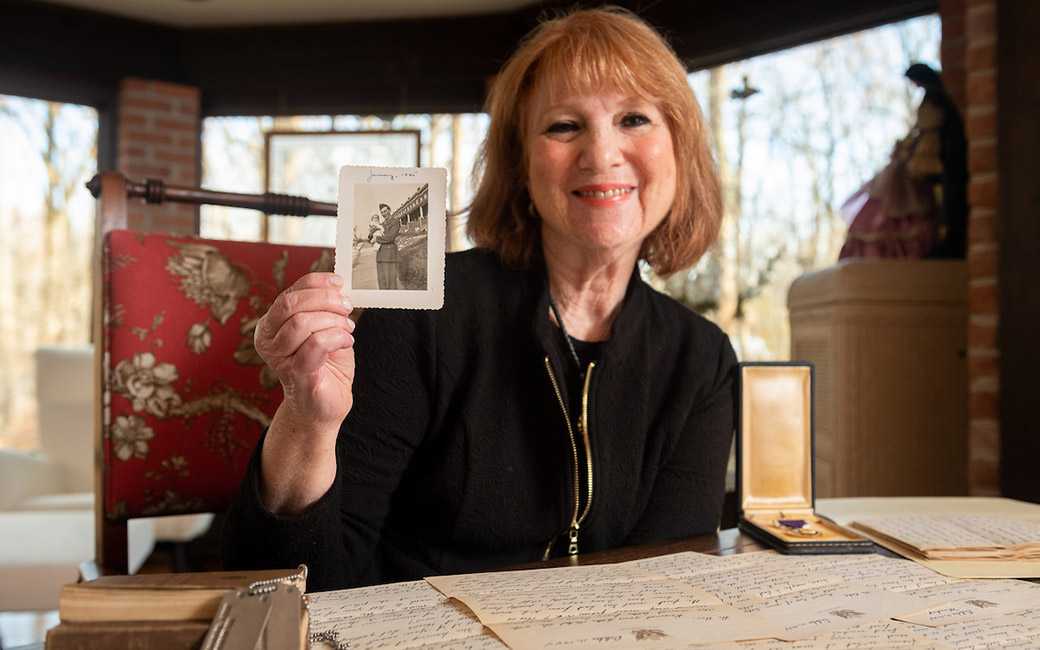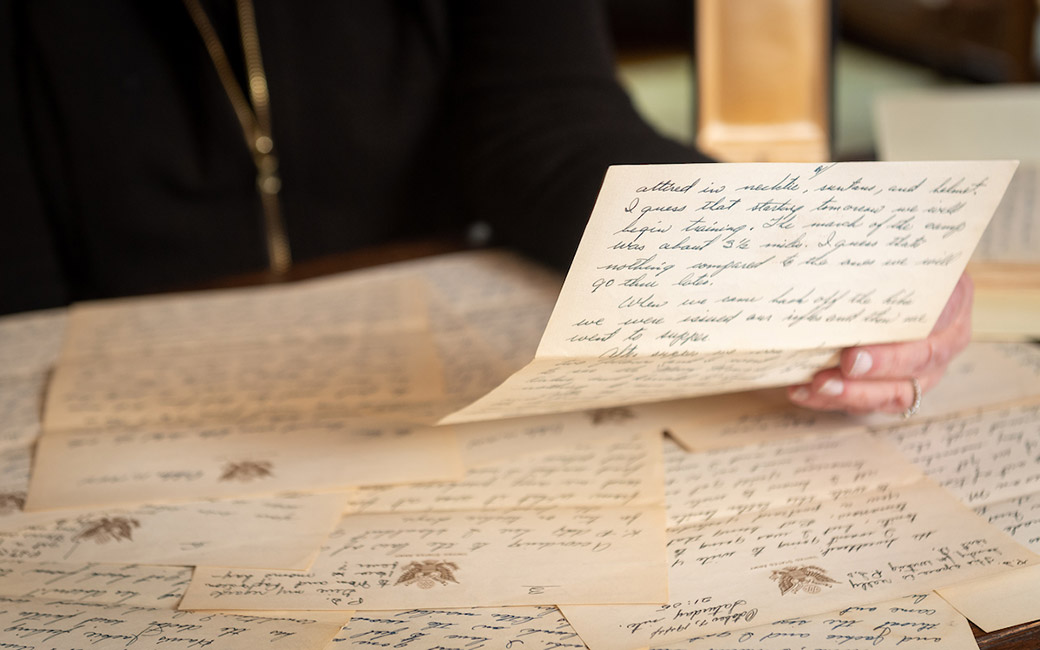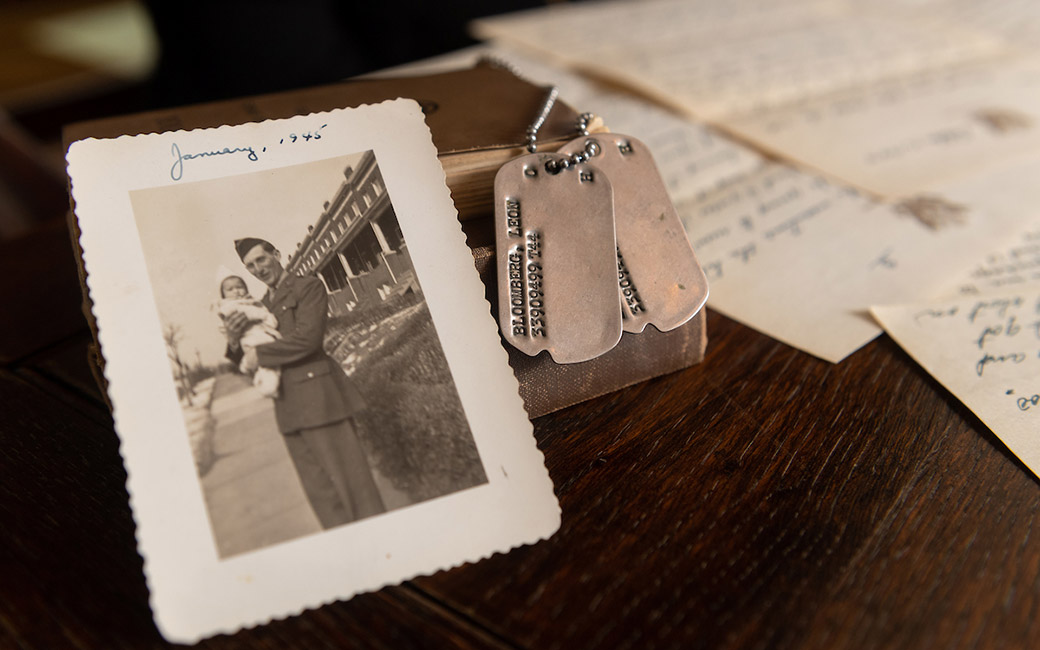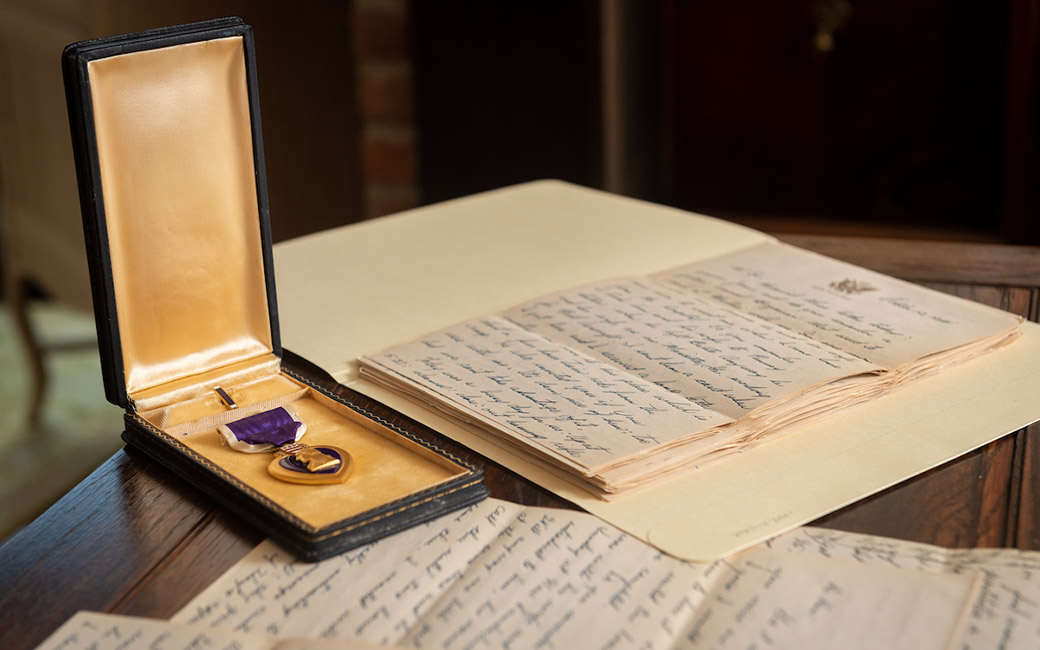
Letters from Nuremberg trials, VE Day find home at Towson University’s Cook Library
Collection of nearly 300 letters shared with Cook Library by Jaclyn Cohen ’65, ’91 offers researchers first-person glimpse into WWII
By Rebecca Kirkman, Henry Basta & Ron Santana on December 13, 2021
While working as a guard in Nuremberg, Germany following WWII, Leon Bloomberg wrote home to his wife, Esther, and their newborn daughter about his experience attending the Nuremberg trials and his philosophy on war while expressing his hope to return home soon.
“I miss you most on Saturday nites [sic] and on Sundays, sweetheart. I wonder just how many more weekends I'm going to spend away from you,” the Jewish American soldier wrote on Feb. 9, 1946. “Rumor has it that by the end of the month the men with 45 points and more will leave. After that, if the demobilization doesn't slow down a lot, it won't be long before your number one husband starts on his way to you.”
It’s one of nearly 300 letters the first-generation American wrote home to Baltimore during his time with the U.S. Army 94th Infantry from September 1944 to February 1946.
Together the letters make up the Leon Bloomberg Papers, a digital collection within the Towson University Special Collections & University Archives containing the letters, postcards and other correspondence detailing Bloomberg’s time in basic training and serving overseas in England, France, Germany and Czechoslovakia. The collection also includes an oral history recorded with Bloomberg in the 1980s, where he shares memories with his wife and children and discusses his childhood and time in the army.
Made available to TU by Bloomberg’s daughter, Jaclyn Cohen ’65, ’91, the letters include direct testimony of the Nuremberg trials, the death of President Roosevelt, VE Day and VJ Day, alongside details of his daily routine, troop movements and personal travels.
Cohen, a former sixth-grade teacher and graduate of the then-Towson State Teachers College and Baltimore Hebrew University, wanted to preserve the letters for her family and as a broader educational resource.
When she learned that the Special Collections & University Archives at her alma mater has collection areas in WWII and Jewish studies, it was a perfect fit.
“There are lessons to be learned in those letters about what it feels like to be a soldier, to be away from your family, to feel isolated, to feel frustrated, to feel proud, to feel American,” she says. “It makes me feel proud to share that.”
History through the eyes of a young soldier
The collection offers an opportunity for students to engage with primary sources.
“It adds a completely different viewpoint to the collections we already have,” says Ashley Todd-Diaz, assistant university librarian for Special Collections & University Archives, of the Bloomberg papers. “As somebody experiencing important historical events like the Nuremberg trials in a firsthand way, the tone, the things that he's sharing, the emotions are all very authentic, and they're not the type of things you’re going to find in a textbook or a journal article.”
Making history personal through primary sources is part of the archives’ mission. “The materials we have here are largely everyday documents and using them is a window into history that you don't really get from documentary films or things that are highly produced,” says research and archives associate Allison Fischbach, who led the digitization of the archive. “It’s content that makes history relatable to people who read it through the words of an individual not unlike yourself.”
Because it’s fully digitized and transcribed, the collection is available to researchers around the globe. “Having the whole collection available online means there is a lot more opportunity for researchers to take their own time with the materials,” Fischbach adds. “They can search through it with keywords and read it more easily—that is immensely valuable.”
Be part of the Albert S. Cook Library’s story.
Learn more about the university archives Make a gift to the libraryIan Smith, a senior studying computer science and a student employee at Cook Library, worked with Fischbach on the project.
“I would transcribe as best as I could from the initial read through, then I would go over it a second time, analyzing each word individually, to make sure that we captured as much detail as possible,” says Smith, noting any strikethroughs, special formatting or letterhead as well.
“The job gave me a better appreciation for diligence and thoroughness,” he says. “As a computer science student, I’m scanning through code and trying to make optimizations left and right. You want to make it as concise but readable as possible. This kind of transcription project really helped me hone my conciseness.”
For Smith, the “nitty, gritty details” in Bloomberg’s letters hit home. “He was only a few years older than me when he shipped out,” Smith says. “That could be me if I was born then. Also, as a Jewish American, I feel a connection to him as a Jewish person because [he was] fighting for freedom.”
Rediscovering the Bloomberg papers
Cohen always knew the letters existed, but she didn’t read them until after her father’s death in 2014. “They lived in my mother’s closet in two battered shoeboxes,” Cohen says, remembering how the boxes followed them from home to home but were never opened.
When her then-7-year-old granddaughter wanted to learn about her great-grandfather’s WWII service for a school project, Cohen finally went through the boxes, spreading out the letters on her den floor and sorting them by date before reading them from start to finish.
“Each one starts by calling my mother something else–‘Hon,’ ‘sweetheart,’ ‘Es’ for Esther, ‘babe,’ ‘baby’—each one is so different in many ways, but they all contain personal sentiments, they all contain missing home, asking for people back home, looking to the future of when he got out of the service and the everyday of what he had to do, whether it's shining his shoes for an inspection or the rigors of basic training,” Cohen says. “So not only is it a picture of my father at that time, which I didn't have an opportunity to see, but it's as an opportunity to see a regular person at war and what he thought of during that time.”
After friends encouraged her, Cohen began to search for an appropriate venue to preserve the letters. She felt comfortable sharing them with TU, she says, because of her connection as an alumna and the university’s educational mission.
“I know that my father would be thrilled that whatever he wrote might be interesting for future generations,” she says. “And he would be thrilled that they're at Towson.”
Education, she says, was close to his heart. “If he knew this was going to be used for educational purposes, that would be one of his crowning achievements,” Cohen says. “Although he would say that his crowning achievements were his wife and his family. I’m happy to do it for him and his memory, because he was a wonderful human being.”
Together, the letters create an intimate portrait of a man at war. “They're very personal letters and sharing that kind of insight into your family members with the rest of the world is a very brave thing to do,” says Fischbach. “So I want to thank [the family] for sharing them with us and for letting other people read them and learn from them.”
“There is a lot of value in that historical insight and specifically Leon's own experience,” she adds. “Their value will only continue to grow.”


